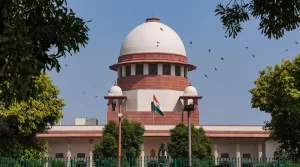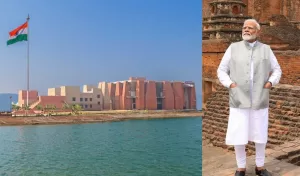Manipur has erupted in violence. For over a month, the Meitei and Kuki people of the state have been wedged in a political conflict. Many have died, properties destroyed and hundreds injured. Some 37,450 people live in 272 grimy relief camps. More than 40 churches have been desecrated and torched across the state as the majority of the Tribals are Christians.
The Supreme Court has ordered protection of displaced persons and religious places of worship. “We have made our concern explicit about the need for protection of people and property and the need for restitution and stabilisation. This is a humanitarian problem. We are concerned deeply about the loss of life and property,” Chief Justice of India (CJI) D.Y. Chandrachud told the state and the centre.
Manipur has always seethed under concealed socio-political variance despite the façade of calm. There has been antipathy towards the tribal people, against the unequal development and disparity in infrastructure between the hills and the valley. The majority of Meitei people live in the plains. Among the Meiteis is a significant community of Muslims. A Naga presence adds to the religio-cultural plurality. Many of them neither converted to Hinduism nor Christianity.
In the 1980s, Manipur as a whole was categorised as ‘disturbed’ and brought under the Armed Forces (Special Powers) Act (AFSPA), 1958. Disregarding the cauldron of internal divisions, Manipuris’ focused on the ‘external threat’, the ‘mayangs’ (a disparaging reference to Indians) rather than consolidating their pluralistic identity.
Congress MLA Alfred Kanngam Arthur exposed facts about disproportionate budget allocations between the hills and the valley. Between 2016 and 2021, from a budget allocation of Rs 22,000 crore in plan funds, the tribals received less than Rs 500 crore. There is also political and economic asymmetry as 20 MLAs represent the hill areas as opposed to 40 from the Valley. The state refutes allegations of large-scale corruption and diversion of funds designated for tribal welfare.
The Kuki people report huge everyday inconveniences owing to lack of basic facilities and development. Increasing poverty makes buying essentials unaffordable.
Meiteis always held the upper hand in Manipur. Their demand to be recognised as Scheduled Tribes is dubious. Tribal communities see through the ploy as an attempt to acquire domination over the hill areas. The hills have a measure of autonomy because of their ST status. The Constitution and other laws safeguards tribal rights through special provisions for the hill areas of Manipur. Other laws prohibit tribal lands from being transferred to non-tribals.
Tribal communities feel that the BJP-led state government is participating in perilous communal politics by backing the Meiteis as ‘Hindus’, against the tribal people who are predominantly Christian. Hindu nationalism is the reason why there is growing religious fundamentalism in the valley. The religious extremism of the majority community feeds minority religious subjugation. Meitei youth have now organised themselves under the banner of an organisation called Arambai Tengol. The BJP has appropriated the traditional religions in the North East under their banner.
Local church leaders have spoken out against the attacks on churches. Father Velickagam, Vicar General of Imphal observed: “We have been targeted systematically and colossal damage has been done to our churches and centres. Assailants roamed freely with no police help despite repeated calls. They raided the Pastoral Training Center; put the pews …and set fire inside the church.” The damage to Catholic churches and other institutions is estimated at more than Rs 20 crore. The government has not offered any assurance over compensation for the losses. Catholics have been roughed up for their Christian identity by rampant mobs. The attacks smack of fanatic elements eager to make Christianity extinct under the pretext of preservation of culture.
The Forum of Religious for Justice and Peace has expressed shock and distress at the violence in Manipur. They wonder how a conflict between two ethnic groups over constitutional status– as tribes with reservations in jobs, education and elected bodies–could turn anti-Christian. Christians, including Catholics, of all communities in the region – whether Meitei, Kuki, Hmars and Mizos, or Chins – have been victims.
“Hidden agendas and ideologies contrary to the constitutional and democratic values often infiltrate into the region jeopardising peaceful coexistence and religious harmony of the state and the region,” stated Archbishop Lumon.
High court stirs up the divisions
At the heart of the violence and Christian resistance was the decision of the Manipur high court directing the state to consider inclusion of the Meitei community in the Scheduled Tribes list. Scheduled Tribes are guaranteed political representation, and receive benefits such as education and employment. Archbishop Lumon explained that their opposition to the Meithei community’s inclusion in the ST list stems from the fear that such a ruling would grant them the right to own land in ethnic tribal areas. Land distribution and unjust political representation in favour of the Meitei community are escalating tensions in the region.
The Supreme Court said that the Manipur high court order was factually incorrect and against the principles laid down by a Constitution bench on classification of communities in the SC/ST list. In a letter to the CJI, the National Lawyers Forum of Priests and Religious called for an immediate response as thousands of people, women and children languish in congested relief camps.
Rising Meitei nationalism and state sponsorship
Political analysts say the rise in Meitei nationalism coincides with the BJP assuming power in the state in2017. There are stark similarities between the militias’ tactics and Hindutva outfits that are blamed for Ram Navami procession violence in several parts of the country.
Attacks on the Kuki community and churches follow the blueprint of violence against minorities elsewhere in India. Radicalised young people from these groups have caused upheaval by setting Kuki homes and shops on fire. The outfits that organised and carried out these attacks obviously had the government’s backing. How else did they obtain addresses of Kuki households? The vigilantes reportedly marked these homes with red paint before launching targeted attacks.
Kukis blame the BJP government’s “politics of hate” for the communal strife. There are visuals of the Meitei militias entering police stations and police training centres and capturing armouries while cops watch on. Kukis had meanwhile been disarmed in a planned manner months before these attacks. Kukis are primarily a hunting community and many retain licensed arms. These were confiscated by the administration, illustrating that the attacks were premeditated and Kukis were left vulnerable.
Old fault lines
The Meiteis and Kukis have been separated by history and geography. The majority Meitei community is concentrated in the densely populated valley that accounts for just 10%of Manipur’s area, while various tribal communities– including the Kukis and Nagas–live in the hills that make up 90% of the state’s territory. The scale of development was skewed in favour of the valley. As universities, medical and engineering colleges, and tertiary hospitals came up in the valley, a sense of deprivation grew among the tribal communities.
There is an attempt by the Meiteis – led by two-time BJP chief minister Biren Singh who – labelled the tribal communities, especially the Kukis, illegal immigrants from Myanmar contrary to available historical and archival records. The government also cites illegal poppy cultivation in parts of the hills as a pretext to typecast the Kuki community as “drug lords”.
Manipur Tribal Forum’s claims
The Manipur Land Revenue Act, 1960, bars non-tribal populations from the valley from buying land in the hills. The Meitei demand for ST status–the trigger for the current conflict– is to infringe on the hills, attack the Kuki cultural legacy, and alter the demographic configuration.
The Manipur Tribals Forum in Delhi have demanded a Supreme Court-monitored Special investigation team (SIT) to investigate the cause of alleged ethnic cleansing against Kuki-Zomi Mizo-Hmar tribals and the role of the government in stoking the fires of the militia groups Arambai Tenggol and Meitei Leepun.
The Manipur Tribal Forum created to protect tribal identity, history, tradition and culture has called on the Manipur state government forces’ actions and asked the government of India to deploy more forces in the tribal-dominated areas to protect vulnerable Tribals. Their political recipe includes President’s Rule in Manipur. The Forum prefers the establishment of a separate administration such as a State, UT or Territorial Council for the Kuki-Zomi-Mizo-Hmar Tribals of Manipur so as to meet the legitimate aspirations of tribals of Manipur.
(Ranjan Solomon is a writer, human rights activist and political commentator. Courtesy: Countercurrents.org.)




